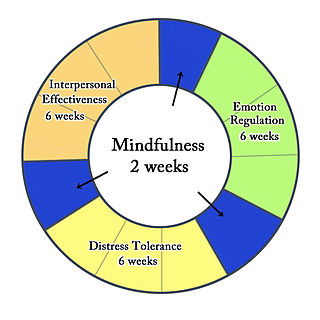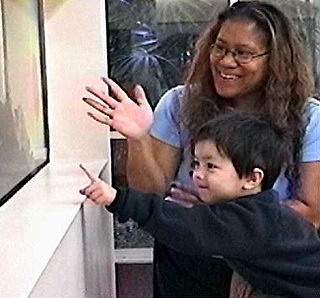Psychology is an academic and applied discipline involving the scientific study of human mental functions and behavior. Occasionally, in addition or opposition to employing the scientific method, it also relies on symbolic interpretation and critical analysis, although these traditions have tended to be less pronounced than in other social sciences, such as sociology. Psychologists study phenomena such as perception, cognition, emotion, personality, behavior, and interpersonal relationships. Some, especially depth psychologists, also study the unconscious mind.

Anger management is a psycho-therapeutic program for anger prevention and control. It has been described as deploying anger successfully. Anger is frequently a result of frustration, or of feeling blocked or thwarted from something the subject feels is important. Anger can also be a defensive response to underlying fear or feelings of vulnerability or powerlessness. Anger management programs consider anger to be a motivation caused by an identifiable reason which can be logically analyzed and addressed.

Dialectical behavior therapy (DBT) is an evidence-based psychotherapy that began with efforts to treat personality disorders and interpersonal conflicts. Evidence suggests that DBT can be useful in treating mood disorders and suicidal ideation as well as for changing behavioral patterns such as self-harm and substance use. DBT evolved into a process in which the therapist and client work with acceptance and change-oriented strategies and ultimately balance and synthesize them—comparable to the philosophical dialectical process of thesis and antithesis, followed by synthesis.
Antisocial behaviours, sometimes called dissocial behaviours, are actions which are considered to violate the rights of or otherwise harm others by committing crime or nuisance, such as stealing and physical attack or noncriminal behaviours such as lying and manipulation. It is considered to be disruptive to others in society. This can be carried out in various ways, which includes, but is not limited to, intentional aggression, as well as covert and overt hostility. Anti-social behaviour also develops through social interaction within the family and community. It continuously affects a child's temperament, cognitive ability and their involvement with negative peers, dramatically affecting children's cooperative problem-solving skills. Many people also label behaviour which is deemed contrary to prevailing norms for social conduct as anti-social behaviour. However, researchers have stated that it is a difficult term to define, particularly in the United Kingdom where many acts fall into its category. The term is especially used in Irish English and British English.
Developmental disorders comprise a group of psychiatric conditions originating in childhood that involve serious impairment in different areas. There are several ways of using this term. The most narrow concept is used in the category "Specific Disorders of Psychological Development" in the ICD-10. These disorders comprise developmental language disorder, learning disorders, developmental coordination disorders, and autism spectrum disorders (ASD). In broader definitions, attention deficit hyperactivity disorder (ADHD) is included, and the term used is neurodevelopmental disorders. Yet others include antisocial behavior and schizophrenia that begins in childhood and continues through life. However, these two latter conditions are not as stable as the other developmental disorders, and there is not the same evidence of a shared genetic liability.

A social skill is any competence facilitating interaction and communication with others where social rules and relations are created, communicated, and changed in verbal and nonverbal ways. The process of learning these skills is called socialization. Lack of such skills can cause social awkwardness.
Applied behavior analysis (ABA), also referred to as behavioral engineering, is a psychological discipline that utilizes the principles of learning based upon respondent and operant conditioning to change socially significant behavior. ABA is the applied form of behavior analysis. The impact ABA has on meaningful behaviors is a defining feature, and what differentiates it from experimental analysis of behavior, which focuses on basic experimental research.
Behaviour therapy or behavioural psychotherapy is a broad term referring to clinical psychotherapy that uses techniques derived from behaviourism and/or cognitive psychology. It looks at specific, learned behaviours and how the environment, or other people's mental states, influences those behaviours, and consists of techniques based on behaviorism's theory of learning: respondent or operant conditioning. Behaviourists who practice these techniques are either behaviour analysts or cognitive-behavioural therapists. They tend to look for treatment outcomes that are objectively measurable. Behaviour therapy does not involve one specific method, but it has a wide range of techniques that can be used to treat a person's psychological problems.
Developmental disability is a diverse group of chronic conditions, comprising mental or physical impairments that arise before adulthood. Developmental disabilities cause individuals living with them many difficulties in certain areas of life, especially in "language, mobility, learning, self-help, and independent living". Developmental disabilities can be detected early on and persist throughout an individual's lifespan. Developmental disability that affects all areas of a child's development is sometimes referred to as global developmental delay.
Behavior modification is a treatment approach that uses respondent and operant conditioning to change behavior. Based on methodological behaviorism, overt behavior is modified with (antecedent) stimulus control and consequences, including positive and negative reinforcement contingencies to increase desirable behavior, as well as positive and negative punishment, and extinction to reduce problematic behavior.

Autism therapies include a wide variety of therapies that help people with autism, or their families. Such methods of therapy seek to aid autistic people in dealing with difficulties and increase their functional independence.
Systemic therapy is a type of psychotherapy that seeks to address people in relationships, dealing with the interactions of groups and their interactional patterns and dynamics.
Challenging behaviour, also known as behaviours which challenge, is defined as "culturally abnormal behaviour(s) of such intensity, frequency or duration that the physical safety of the person or others is placed in serious jeopardy, or behaviour which is likely to seriously limit or deny access to the use of ordinary community facilities". "Ordinarily we would expect the person to have shown the pattern of behaviour that presents such a challenge to services for a considerable period of time. Severely challenging behaviour is not a transient phenomenon."
The professional practice of behavior analysis is a domain of behavior analysis, the others being radical behaviorism, experimental analysis of behavior and applied behavior analysis. The practice of behavior analysis is the delivery of interventions to consumers that are guided by the principles of radical behaviorism and the research of both experimental and applied behavior analysis. Professional practice seeks to change specific behavior through the implementation of these principles. In many states, practicing behavior analysts hold a license, certificate, or registration. In other states, there are no laws governing their practice and, as such, the practice may be prohibited as falling under the practice definition of other mental health professionals. This is rapidly changing as behavior analysts are becoming more and more common.
Functional analysis in behavioral psychology is the application of the laws of operant and respondent conditioning to establish the relationships between stimuli and responses. To establish the function of operant behavior, one typically examines the "four-term contingency": first by identifying the motivating operations, then identifying the antecedent or trigger of the behavior, identifying the behavior itself as it has been operationalized, and identifying the consequence of the behavior which continues to maintain it.
Psychology encompasses a vast domain, and includes many different approaches to the study of mental processes and behavior. Below are the major areas of inquiry that taken together constitute psychology. A comprehensive list of the sub-fields and areas within psychology can be found at the list of psychology topics and list of psychology disciplines.
Family therapy is a branch of psychotherapy focused on families and couples in intimate relationships to nurture change and development. It tends to view change in terms of the systems of interaction between family members.
The Questions About Behavior Function (QABF) measure is a widely used indirect assessment tool designed to assist mental health practitioners in assessing the function of maladaptive behaviors in individuals diagnosed with a developmental disability. It was co-developed by Johnny Matson. The measure a reporter-based instrument, which relies on information from raters who are familiar with the individual being assessed. As such, parents and caregivers are frequently asked to provide pertinent information. The measure consists of 25 items, each of which ask a question about an individual's behavior and require the rater to respond on a Likert-type rating scale. On the basis of the 25 items, the QABF produces scores in 5 distinct categories: Attention, Escape, Physical, Tangible, and Nonsocial.
A behaviour support systems review is the process of gathering data, examining and reporting on the capability and capacity of a service system or a service organisation to deliver positive behaviour support to people with an intellectual disability, general learning disability, or generalized neurodevelopmental disorder characterized by significantly impaired adaptive functioning.